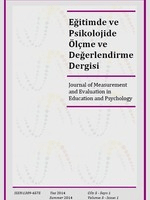
Journal of Measurement and Evaluation in Education and Psychology-EPOD
Scope & Guideline
Bridging Theory and Practice in Education and Psychology.
Introduction
Aims and Scopes
- Educational Measurement Techniques:
The journal covers a broad range of educational measurement techniques, including item response theory, computerized adaptive testing, and formative assessment methodologies, aiming to improve test design and evaluation. - Psychological Assessment:
Research on psychological assessment methods is a core focus, including studies on reliability, validity, and the effectiveness of various psychological testing approaches. - Statistical Modeling and Analysis:
The journal often features advanced statistical models and methodologies, such as multilevel modeling, latent class analysis, and factor mixture models, to analyze educational and psychological data. - Assessment Innovations:
It encourages contributions that explore innovative assessment practices, including the use of technology in assessments, such as e-portfolios, learning analytics, and online assessment tools. - Cross-Cultural Measurement Invariance:
The journal emphasizes the importance of cross-cultural studies in measurement, particularly in understanding how different groups perform on assessments and ensuring measurement invariance across diverse populations.
Trending and Emerging
- Computerized Adaptive Testing (CAT):
There is an increasing focus on computerized adaptive testing, with studies exploring its robustness, item selection algorithms, and the impact of item preknowledge, highlighting its relevance in modern assessment practices. - Formative Assessment and Learning Analytics:
Research surrounding formative assessment and the use of learning analytics is on the rise, as educators seek to enhance student learning through real-time feedback and data-driven instructional strategies. - Differential Item Functioning (DIF) Analysis:
DIF analysis continues to be a prominent theme, with researchers investigating various methods to detect and address bias in assessments across different demographic groups. - Meta-Analysis and Systematic Reviews:
There is a growing trend in conducting meta-analyses and systematic reviews, which synthesize existing research to provide comprehensive insights into measurement practices and their effectiveness. - Technology-Enhanced Assessments:
The integration of technology in assessments, including interactive video tools and e-portfolios, is emerging as a significant theme, reflecting the shift towards digital learning environments.
Declining or Waning
- Traditional Test Methods:
There has been a noticeable decline in the focus on traditional test methods and classical test theory approaches, as researchers increasingly favor modern techniques like item response theory and computerized adaptive testing. - Generalizability Theory:
Although still relevant, studies specifically centered around generalizability theory have decreased, possibly due to the growing emphasis on more complex models that address measurement precision and reliability in new ways. - Qualitative Assessment Methods:
Research on qualitative assessment methods appears to be less prominent, suggesting a shift towards quantitative analysis and statistical rigor in educational and psychological measurement.
Similar Journals
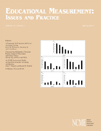
Educational Measurement-Issues and Practice
Shaping Effective Policies through Rigorous Measurement.Educational Measurement-Issues and Practice, published by WILEY, stands as a premier journal in the field of education, recognized for its commitment to advancing understanding of measurement issues and methodologies in educational contexts. Established in 1982, this journal spans over four decades of scholarly contributions, maintaining a remarkable Q1 status within the Education category as per the 2023 metrics, and ranking #407 out of 1543 in Scopus's Education domain, placing it in the top 73rd percentile. It features a range of articles that address critical issues concerning educational assessment practices, policy implications, and innovative measurement methodologies, aimed at professionals, researchers, and students dedicated to enhancing educational assessment frameworks. With its ongoing focus on contemporary challenges and developments in the field, Educational Measurement-Issues and Practice plays a crucial role in shaping effective educational policies and practices worldwide, making it an essential resource for anyone involved in educational research and measurement.

Quantitative Methods for Psychology
Fostering Collaboration Through Open-Access ResearchQuantitative Methods for Psychology, with ISSN 1913-4126 and E-ISSN 2292-1354, is a premier open-access journal published by the University of Montreal, Department of Psychology. Since its inception in 2005, this journal has served as a vital resource for the dissemination of cutting-edge research and methodological advancements in psychological science. With a focus on quantitative approaches, it welcomes submissions that explore innovative statistical techniques, data analysis methodologies, and empirical studies that enhance understanding in psychology. The journal’s commitment to accessibility ensures that researchers, practitioners, and students alike can benefit from the wealth of knowledge it offers, fostering collaboration and advancing the field. As an integral platform for sharing significant findings and best practices, Quantitative Methods for Psychology is positioned to make substantial contributions to the landscape of psychological research.
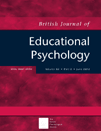
BRITISH JOURNAL OF EDUCATIONAL PSYCHOLOGY
Transforming educational practices through research.The British Journal of Educational Psychology (BJEP), published by Wiley, stands as a leading platform in the fields of Developmental and Educational Psychology and Education. Since its inception in 1931, BJEP has consistently delivered high-quality, peer-reviewed research that addresses critical issues and advances knowledge within the educational sphere. With a commendable impact factor and a prominent Q1 ranking in both the Developmental and Educational Psychology categories, the journal boasts an impressive standing among its peers, reflected by its rankings in Scopus (Rank #101 out of 1543 in Social Sciences – Education and Rank #35 out of 360 in Developmental Psychology). Researchers, educators, and students alike will find valuable insights and innovative practices that shape learning and teaching in diverse contexts. Although currently not available as open access, the journal remains dedicated to disseminating pivotal findings that contribute to effective educational psychology practices worldwide. Explore the rich tapestry of knowledge that BJEP offers, crafted from contributions across the globe at the forefront of educational research.
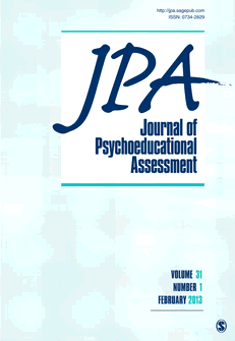
JOURNAL OF PSYCHOEDUCATIONAL ASSESSMENT
Bridging clinical psychology and education for improved assessment strategies.The JOURNAL OF PSYCHOEDUCATIONAL ASSESSMENT, published by SAGE PUBLICATIONS INC, serves as a leading platform for disseminating high-quality research in the fields of clinical psychology and education. With its ISSN 0734-2829 and E-ISSN 1557-5144, this distinguished journal has been at the forefront of advancing knowledge since its inception in 1983, and it continues to publish innovative studies aimed at enhancing psychoeducational assessment practices. Recognized in the 2023 category quartiles as Q2 in Clinical Psychology, Education, and miscellaneous Psychology, the journal holds significant rankings in Scopus, with Education at rank #479, Clinical Psychology at #126, and General Psychology at #100, reflecting its substantial impact in the social sciences. Although it does not offer Open Access, the valuable insights provided in its articles contribute meaningfully to the ongoing discourse among researchers, professionals, and students alike. The JOURNAL OF PSYCHOEDUCATIONAL ASSESSMENT is an essential resource for those seeking to enhance their understanding of psychoeducational methods and assessments, ultimately aiming to improve educational outcomes and clinical practices.
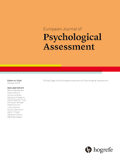
EUROPEAN JOURNAL OF PSYCHOLOGICAL ASSESSMENT
Exploring New Horizons in Psychological EvaluationWelcome to the European Journal of Psychological Assessment, a prestigious publication in the field of applied psychology, published by Hogrefe Publishing Corp. With a strong emphasis on advancing the methods and practices of psychological assessment, this journal has established itself as a crucial resource for researchers, practitioners, and students alike. Since its inception in 1996, it has built a reputation for quality and innovation, reflected by its impressive Q1 ranking in the applied psychology category, signifying its critical role in shaping the future of the discipline. The journal's impactful contributions – ranked #62 out of 249 within its field and indexed in Scopus at the 75th percentile – make it an essential reading for anyone interested in the latest assessment techniques and research findings. Although not an open-access journal, it continues to reach audiences through institutional subscriptions and provides a wealth of knowledge aimed at enhancing psychological practice and research.

PSYCHOLOGICAL METHODS
Fostering Excellence in Psychological Research MethodologiesPsychological Methods, published by the American Psychological Association, is a leading journal in the field of psychology, recognized for its rigorous approach to the methodology of psychological research. With an ISSN of 1082-989X and an E-ISSN of 1939-1463, this esteemed journal facilitates the dissemination of innovative methods and analysis techniques that are critical for advancing psychological science. Its impressive ranking as Q1 in both the History and Philosophy of Science and Psychology (miscellaneous) categories underscores its influence, while its Scopus rank places it in the top 2 out of 97 journals in its field, reflecting its high visibility and importance among researchers, professionals, and students. Although not an open-access journal, Psychological Methods continues to serve as a vital resource for the latest advancements and discussions, aiming to enhance the quality of psychological research globally. With a publication history spanning from 1996 to 2024, it remains a cornerstone for scholars committed to elevating the methodological standards prevalent within the discipline.
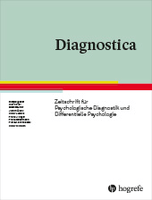
DIAGNOSTICA
Connecting research and practice in clinical psychology.DIAGNOSTICA is a prominent international journal published by Hogrefe Verlag, focusing on Clinical Psychology. With its ISSN 0012-1924 and E-ISSN 2190-622X, DIAGNOSTICA has carved a niche for itself within the academic community, particularly in clinical psychological research and practice. The journal has been a vital platform for sharing innovative research findings since its inception in 1996 and continues to contribute to the field with its convergence running through to 2024. Despite being categorized as Q3 in the 2023 Clinical Psychology ranking, it serves an important role in disseminating valuable insights and encourages discourse among professionals and scholars. Researchers, practitioners, and students can benefit from its rich repository of studies encompassing various aspects of psychological assessment, diagnosis, and treatment methodologies. Located in Göttingen, Germany, DIAGNOSTICA remains dedicated to advancing the understanding of psychological well-being, thus reinforcing its significance in clinical practice and mental health research.
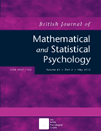
BRITISH JOURNAL OF MATHEMATICAL & STATISTICAL PSYCHOLOGY
Exploring the Intersections of Data and Human BehaviorThe British Journal of Mathematical & Statistical Psychology, published by Wiley, is a prestigious peer-reviewed journal that plays a pivotal role in advancing the interdisciplinary fields of psychology, mathematics, and statistics. With an ISSN of 0007-1102 and an E-ISSN of 2044-8317, it boasts a Category Quartile ranking of Q1 in diverse areas including Arts and Humanities, Medicine, Psychology, and Statistics and Probability as of 2023, signifying its considerable impact and relevance. This journal provides a platform for the dissemination of high-quality research and innovative methodological advancements that address complex psychological phenomena through rigorous statistical frameworks. It covers a breadth of topics from classic problems to modern data analytic techniques, appealing to researchers, professionals, and students alike. Founded in 1965, the journal continues to thrive global scholarly dialogue until 2024, fostering collaboration among disciplines and enhancing understanding of psychological data. Although it is not an open access journal, its rigorous selection process ensures that only the most significant and impactful research is published, further maintaining its esteemed position within the academic community.

TPM-Testing Psychometrics Methodology in Applied Psychology
Advancing Psychometric Insights for Applied PsychologyTPM-Testing Psychometrics Methodology in Applied Psychology is a distinguished journal published by CENTRO INFORMAZIONE SCIENTIFICA ECONOMICA SOCIALE-CISES SRL in Italy, focusing on the vital intersection of psychometrics and applied psychology. With an ISSN of 1972-6325, this journal has been an essential resource since its inception in 2005, providing an academic platform for researchers, professionals, and students dedicated to advancing the field. The journal currently holds a Q3 ranking in both Applied Psychology and Psychology (miscellaneous) within the prestigious Scopus database, highlighting its commitment to scholarly excellence and relevance. Although it is not an open-access journal, TPM is a valuable source for rigorous methodologies and innovative applications in psychological testing and assessment. As the field continues to evolve, TPM seeks to address contemporary challenges and promote interdisciplinary collaboration, making it a crucial contributor to the landscape of applied psychology research and practice.
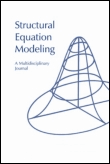
STRUCTURAL EQUATION MODELING-A MULTIDISCIPLINARY JOURNAL
Connecting Theories and Practices in Structural Equation ModelingSTRUCTURAL EQUATION MODELING-A MULTIDISCIPLINARY JOURNAL, published by ROUTLEDGE JOURNALS, TAYLOR & FRANCIS LTD, stands as a premier platform for the dissemination of innovative research and applications in structural equation modeling (SEM). With ISSN 1070-5511 and E-ISSN 1532-8007, this journal has maintained a robust impact in various academic realms since its inception in 1994. Renowned for its exceptional quality, it ranks in the Q1 category across four distinct disciplines, including Decision Sciences, Economics, Econometrics and Finance, Modeling and Simulation, and Sociology and Political Science. The journal's impressive Scopus rankings reflect its significant influence, particularly in Economics and Sociology, with percentile ranks placing it in the top tier of relevant fields. Researchers, professionals, and students alike will benefit from its comprehensive articles, which explore theoretical advancements and practical applications of SEM. In a landscape increasingly dependent on data-driven decision-making, the journal serves not only as a pivotal resource for current trends and methodologies but also as an essential guide for future explorations in multidimensional data analysis.